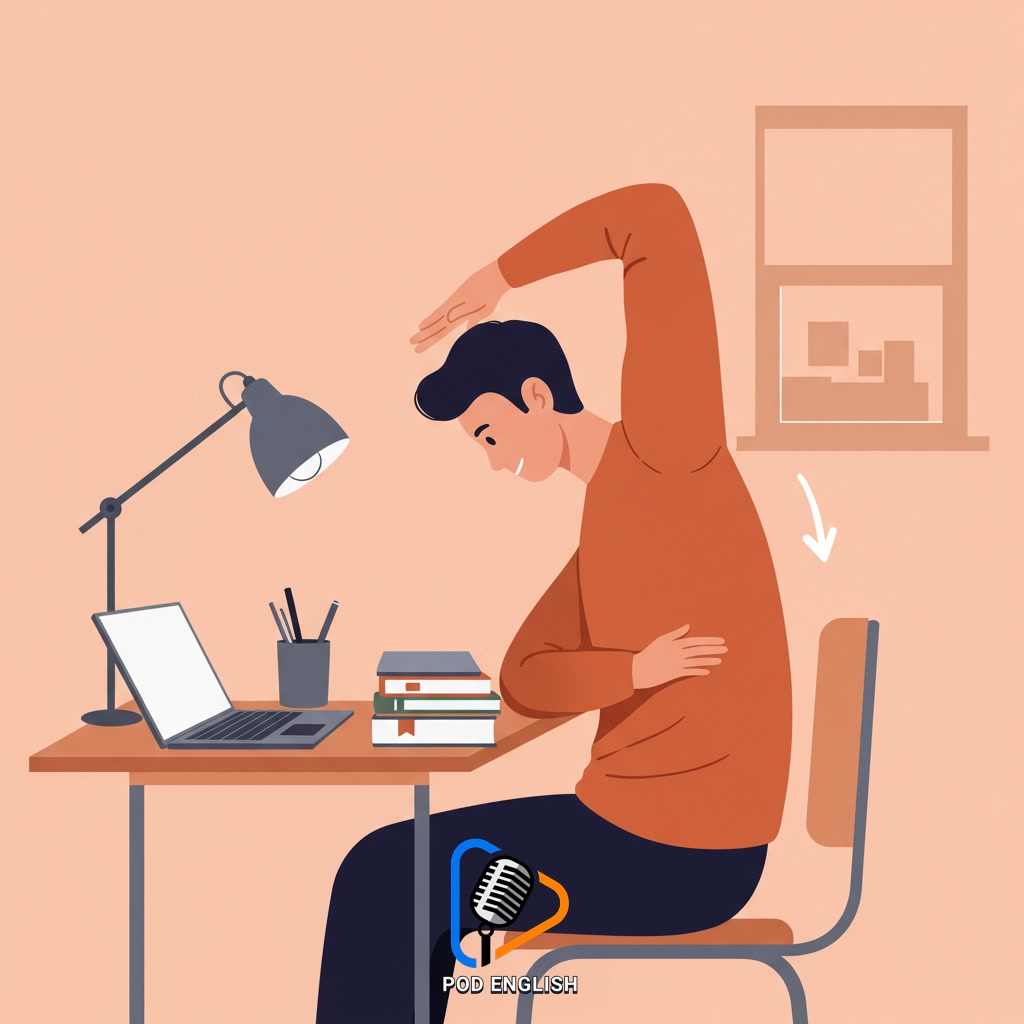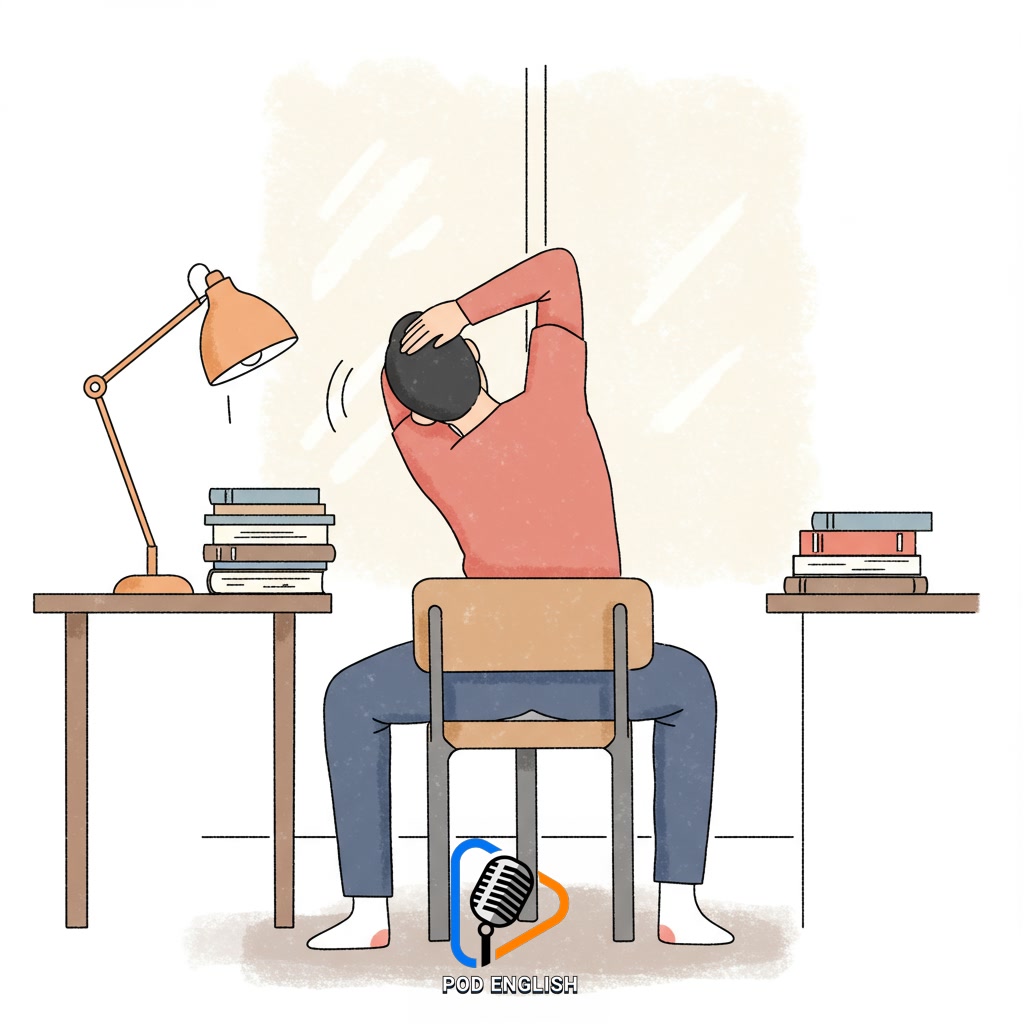Learn English
Boost English Learning: Simple Stretches to Reduce Study Stress

This content focuses on how incorporating simple physical stretches can help individuals manage the stress associated with learning English. It explores easy techniques designed to promote relaxation and improve focus during study sessions. By reducing tension through these movements, the aim is to create a more conducive environment for effective language acquisition. These practical tips support the overall process of learning English by addressing common study-related challenges.
Table of Contents
- Section 1: Understanding Study Stress in English Learning
- Section 2: How Stress Affects Your English Learning Progress
- Section 3: The Power of Simple Stretches for Mind and Body
- Section 4: Easy Stretches for Desk-Bound English Learners
- Section 5: Incorporating Stretches into Your Study Routine
- Section 6: Boosting Focus and Retention Through Movement
- Section 7: Stretch Your Way to More Effective English Learning
Section 1: Understanding Study Stress in English Learning
Learning English can be incredibly rewarding, but it’s also common to experience study stress. This stress isn’t just about feeling tired; it’s the pressure, anxiety, and frustration that can arise when facing new grammar rules, vast vocabulary, or the challenge of speaking. You might feel overwhelmed by the amount to learn, worried about making mistakes, or frustrated by slow progress. This stress can make it hard to concentrate, remember new words, and even make you want to avoid studying altogether. Understanding that this stress is a normal part of the learning process is the first step towards managing it effectively and creating a better study environment.

Section 2: How Stress Affects Your English Learning Progress
Stress isn’t just an uncomfortable feeling; it actively gets in the way of your English learning. When you’re stressed, your brain finds it harder to focus on new vocabulary, grammar rules, or even listening to conversations. It’s like trying to learn in a noisy room – the stress is the noise. This makes it difficult to absorb and remember information, leading to frustration and a feeling of not making progress. High stress levels can also decrease your motivation to study, making you avoid practice sessions or feel too overwhelmed to start. You might find yourself forgetting things you thought you knew or struggling with tasks that felt easier before. Ultimately, stress can slow down your learning pace and make the whole process feel much more challenging than it needs to be.

Section 3: The Power of Simple Stretches for Mind and Body
Building on the understanding that stress negatively impacts learning, simple stretches offer a practical pathway to counter this. Engaging in even brief, gentle movements helps to release stored physical tension that often accompanies mental stress. This physical release sends signals to your brain, promoting a sense of calm and reducing the ‘fight or flight’ response. By easing bodily stiffness and promoting circulation, stretching can clear your head, improve concentration, and create a more receptive state for absorbing information. This mind-body connection is powerful: a relaxed body supports a focused mind, making your English study sessions more effective and less overwhelming.

Section 4: Easy Stretches for Desk-Bound English Learners
Spending hours focused on English vocabulary or grammar can lead to stiffness and tension, especially when you’re sitting at a desk. Fortunately, you don’t need to leave your study station to release this built-up stress. Simple stretches designed for seated positions can make a big difference. Gentle neck rolls can ease tightness from looking down at books or screens, while shoulder shrugs help release tension held in the upper back. Wrist circles and finger stretches are great for counteracting strain from typing or writing. Even a simple seated spinal twist can improve circulation and posture, helping you feel more alert and less stressed. Incorporating these brief movements every 30-60 minutes can break the cycle of tension and keep your mind clearer for effective English learning.

Section 5: Incorporating Stretches into Your Study Routine
Building on the idea that you don’t need to disrupt your study flow, incorporating stretches is straightforward. Aim to take a short movement break every 45-60 minutes. These don’t have to be long sessions; even 2-3 minutes of targeted stretches can make a difference. You can perform many beneficial stretches right at your desk or standing beside it. For example, neck rolls, shoulder shrugs, or simple seated twists can release tension built up from concentrating on language tasks. Scheduling these brief physical interruptions helps break monotony, re-energizes your mind, and prepares you for the next study segment, making your English learning sessions more productive and less physically demanding. Consistency is key – make these quick stretches a regular part of your study routine.

Section 6: Boosting Focus and Retention Through Movement
Taking those short movement breaks every 45-60 minutes isn’t just about avoiding stiffness; it’s a powerful strategy for enhancing your cognitive function, directly impacting your English learning. When you stretch or move, even slightly, you boost blood flow to your brain. This increased circulation delivers more oxygen and nutrients, which helps clear mental fatigue and sharpen your focus. Think of it as hitting a ‘refresh’ button for your mind. By breaking the sedentary cycle, you interrupt distracting physical tension and mental wandering, making it easier to absorb new vocabulary, understand complex grammar points, and retain the information you’re working hard to learn. It’s a simple physical act with significant mental benefits for your study sessions.

Section 7: Stretch Your Way to More Effective English Learning
Building on the idea of short movement breaks, dedicating a few minutes to simple stretches is a powerful way to combat the physical tension that often accompanies focused study. When you’re concentrating hard on English grammar or vocabulary, muscles in your neck, shoulders, and back can tighten up, contributing to feelings of stress and fatigue. Gentle stretching releases this built-up tension, sending a signal of relaxation to your brain. This physical release helps clear mental clutter, allowing you to return to your studies with a fresher mind and improved focus. By reducing physical discomfort and promoting a calmer state, stretching makes it easier to absorb new information and can significantly enhance the effectiveness of your English learning sessions, making the process feel less overwhelming and more productive.














